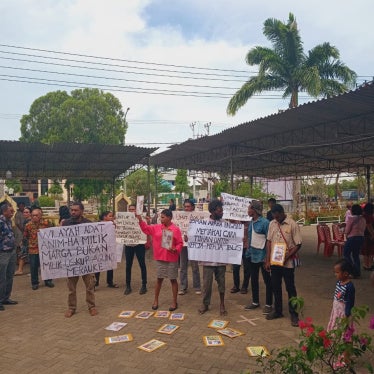(New York) - The United Nations Security Council should impose an arms embargo on Burma in response to the Burmese military government’s continuing recruitment of children for its national army, Human Rights Watch said today.
Tomorrow, the Security Council’s working group on children and armed conflict will meet to consider a report by UN Secretary-General Ban Ki-moon that has found “grave violations” against children in Burma, including patterns of underage military recruitment.
The UN secretary-general has issued five reports since 2002 citing Burma’s national army, the Tatmadaw, for violating international law prohibiting the use of child soldiers. The reports have also cited several non-state armed groups in Burma for recruiting children, including armed opposition groups.
“Burma’s army has recruited thousands of children to fill its ranks,” said Jo Becker, children’s rights advocate for Human Rights Watch. “The Security Council needs to show Burma’s generals that they cannot get away with such horrendous practices.”
The Security Council’s working group on children and armed conflict must now consider what action the Security Council should take in response to the secretary-general’s new report on violations in Burma. In past resolutions on children and armed conflict, the Security Council has stated that it will consider targeted measures – including embargoes on arms and other military assistance – in cases where governments and armed groups fail to end their use of child soldiers.
In a report released in October, Human Rights Watch documented how children as young as 10 are recruited by force into Burma’s army. At recruitment centers, officers falsify documents to register new recruits as age 18, even if they are clearly underage. Former soldiers reported that in many training camps, children made up more than 30 percent of new recruits.
After putting children through military training, the Burmese army uses them in combat against ethnic armed opposition groups, and sometimes to participate in human rights abuses against civilians. Children who try to escape are typically beaten, re-recruited, or imprisoned.
The army’s forced recruitment is designed to fill personnel shortages as a result of both increased desertion rates and army expansion. This expansion includes new units established to utilize arms purchased from China, India, Russia, and Ukraine.
Under Burma’s national law, the recruitment of anyone below age 18 is prohibited. The recruitment and use of child soldiers below the age of 15 is considered a war crime under international law.
In 2004, the military government, known as the State Peace and Development Council, established a high-level committee to prevent the recruitment of underage soldiers. Human Rights Watch’s investigation found that the committee had taken little action to end child recruitment, and instead repeatedly denied outside reports of child soldier use by government forces. There is no independent oversight of this committee, nor is there monitoring of recruitment centers or access to military bases throughout Burma’s hinterland, where many child soldiers are deployed.
“The Security Council should not be fooled by Burma’s repeated promises to address the army’s use of child soldiers,” said Becker. “Nothing short of an arms embargo is likely to make Burma’s military government end all recruitment and use of children.”
Non-state armed groups in Burma also use child soldiers, though practices vary widely. Some groups actively recruit and use children in armed conflict, while others, including the Karenni Army and Karen National Liberation Army, have taken steps to end the recruitment of children into their forces. In its report, Human Rights Watch noted that cooperation by the Karenni Army and its efforts since 2002 to end the use of child soldiers had eradicated the practice, and recommended the armed group be removed from the UN secretary-general’s list of parties using child soldiers.
“Burma’s diplomatic supporters in the Security Council, China and Russia, are also its main arms suppliers,” Becker said. “These countries sell weapons to Burma with scant regard for the impact on the civilian population.”






